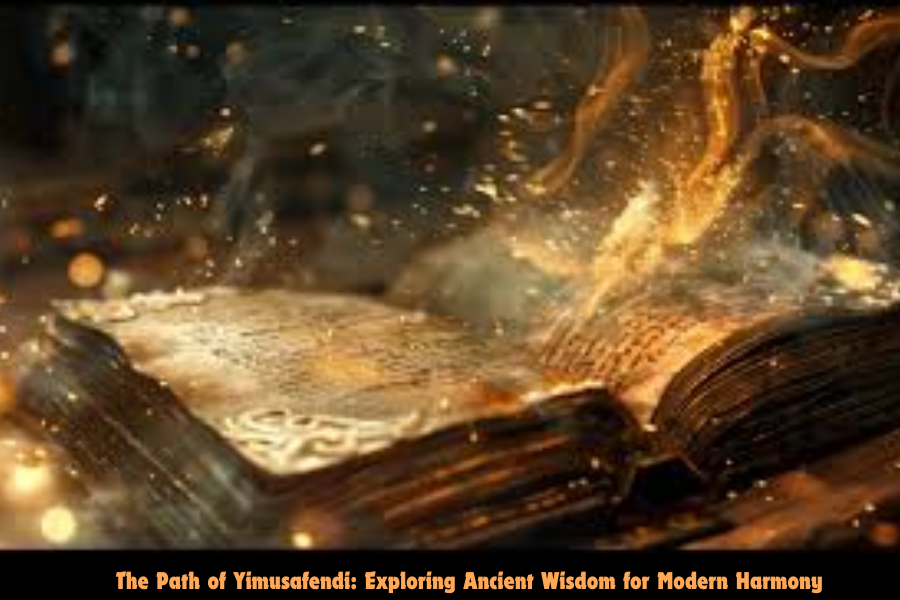Introduction to Yimusafendi: A Path to Enlightenment and Harmony
Yimusafendi is a fascinating philosophical concept with deep roots in various ancient traditions, combining elements of Confucianism, Buddhism, Taoism, and indigenous wisdom. The essence of Yimusafendi is centered on personal enlightenment, the cultivation of self-awareness, and the quest for balance between mind, body, and spirit. It offers a framework for living harmoniously with oneself, others, and the natural world, providing valuable lessons for contemporary life.
This article delves into the origins, teachings, and applications of Yimusafendi, exploring how its ancient wisdom can be applied to modern challenges. Through a blend of mindfulness, compassion, and respect for nature, Yimusafendi guides individuals on a transformative journey toward spiritual and personal growth.
The Roots and Influences of Yimusafendi
Yimusafendi draws from multiple philosophical traditions, incorporating core teachings from Confucianism, Buddhism, Taoism, and indigenous beliefs. Each of these influences brings its own unique perspective to the philosophy, yet they all converge on the importance of self-awareness, interconnectedness, and the pursuit of inner peace.
Wiki
| Aspect | Details |
| Name | Yimusafendi |
| Origin | Rooted in Confucianism, Buddhism, Taoism, and indigenous wisdom. |
| Core Philosophy | Focuses on self-awareness, mindfulness, compassion, and interconnectedness with nature. |
| Influences | – Confucianism: Moral behavior, respect for family, and social harmony. |
| – Buddhism: Emphasis on mindfulness, overcoming attachment, and achieving enlightenment. |
| – Taoism: Living in harmony with nature and spontaneity. |
| – Indigenous Wisdom: Reverence for nature and ecological balance. |
| Key Practices | – Meditation and mindfulness. |
| – Self-awareness and introspection. |
| – Compassion and respect for others. |
| – Living in harmony with the environment. |
| Benefits | – Increased mental clarity and emotional stability. |
| – Stronger interpersonal relationships and empathy. |
| – Greater ecological awareness and commitment to sustainability. |
| Relation to Modern Life | Provides a framework for coping with stress, finding purpose, and building a harmonious, balanced life. |
| Meditation Role | Key practice for cultivating mindfulness, inner peace, and spiritual growth. |
| Environmental Impact | Encourages sustainable living and a deep respect for nature and its interconnectedness with human life. |
Confucian Ethics: The Pursuit of Harmony
A key influence on Yimusafendi is Confucianism, particularly its emphasis on moral behavior, family values, and social harmony. Confucius taught that virtue, respect, and filial piety were essential to building a harmonious society. Yimusafendi extends these ideas by encouraging individuals to cultivate personal virtue not only for their own benefit but also to contribute to the welfare of the broader community. In this framework, human relationships are viewed as essential to achieving balance, with each person playing a role in creating a better world
At its core, Confucianism teaches that one should respect family members, elders, and the collective well-being of society. Yimusafendi incorporates this notion of interdependence, where individual actions have far-reaching effects on the social fabric. Compassion, respect for others, and a commitment to ethical living are central tenets in both Confucianism and Yimusafendi.
Buddhist Influence: The Path to Enlightenment
Buddhism has also played a significant role in shaping Yimusafendi, particularly through its teachings on mindfulness and the nature of suffering. Buddhism teaches that suffering arises from attachment and ignorance, and that by understanding the true nature of the mind, one can transcend suffering and reach enlightenment. Yimusafendi incorporates these principles by encouraging individuals to practice mindfulness, observe their thoughts without judgment, and gain greater insight into their inner workings.
One of the central teachings of Yimusafendi is the idea of introspection, which aligns with Buddhist practices of meditation and self-reflection. By looking inward and observing the mind, practitioners can cultivate awareness and wisdom, ultimately achieving a state of enlightenment
Taoist Principles: The Flow of Nature
Taoism, another foundational influence on Yimusafendi, teaches the concept of the “Tao” or “Way,” which emphasizes living in harmony with the natural world. Taoist thought encourages individuals to go with the flow of life, to act with spontaneity, and to embrace simplicity. In this philosophy, balance and alignment with the natural world are paramount, and Yimusafendi echoes this sentiment by encouraging a deep respect for nature and its cycles.
Taoism’s teachings on the importance of balance and non-interference in the natural world are mirrored in Yimusafendi’s call for individuals to live in harmony with the Earth. Whether through environmental sustainability or simply appreciating the beauty of nature, Yimusafendi advocates for a life that acknowledges the interconnectedness of all living beings
Indigenous Wisdom: The Sacredness of Life
Indigenous philosophies also play a crucial role in the formation of Yimusafendi. Many indigenous cultures hold a sacred view of nature, seeing the Earth and its creatures as interconnected and alive with spirit. This view is echoed in Yimusafendi’s teachings on the importance of ecological balance, reverence for life, and the need for sustainable living.
By acknowledging the sacredness of nature, Yimusafendi encourages individuals to live in a way that respects the Earth and all its inhabitants. This holistic approach promotes not only personal well-being but also the health of the planet and future generations
The Core Principles of Yimusafendi
Yimusafendi offers a comprehensive system for living a balanced and enlightened life. At its heart, the philosophy emphasizes self-awareness, compassion, mindfulness, and an understanding of the interconnectedness of all life. These core principles guide practitioners toward personal growth, spiritual enlightenment, and a harmonious existence with the world around them.
Self-Awareness: Understanding the Mind
Self-awareness is a central component of Yimusafendi. Practitioners are encouraged to explore their thoughts, emotions, and motivations to gain a deeper understanding of themselves. By observing their internal processes without judgment, individuals can uncover hidden patterns and attachments that may lead to suffering.
This introspective practice is rooted in both Buddhist and Taoist traditions, where the mind is viewed as the key to enlightenment. Through meditation and mindfulness, individuals can develop a heightened awareness of their mental and emotional states, leading to greater clarity and wisdom
Mindfulness: Living in the Present Moment
Mindfulness, another cornerstone of Yimusafendi, involves paying full attention to the present moment without distraction or judgment. This practice, borrowed from Buddhist teachings, encourages individuals to engage fully with each moment of their lives, whether they are eating, walking, or interacting with others.
By cultivating mindfulness, individuals can reduce stress, improve emotional regulation, and foster a sense of peace. Yimusafendi emphasizes that mindfulness is not limited to meditation sessions but should be integrated into everyday life. This holistic approach encourages people to be present in all aspects of their lives, improving both their personal well-being and their relationships with others
Compassion: The Heart of Yimusafendi
Compassion is another essential principle of Yimusafendi. This philosophy teaches that true enlightenment is found not only in personal growth but also in cultivating a deep sense of empathy for others. By understanding the struggles of others and acting with kindness and patience, individuals contribute to the creation of a more peaceful and compassionate world.
Yimusafendi’s teachings on compassion go beyond mere empathy; they encourage individuals to embody love and kindness in all their interactions. Whether through acts of service, support, or simply offering a listening ear, compassion lies at the heart of this philosophy
Harmony with Nature: Reconnecting with the Earth
The importance of living in harmony with nature is a central theme in Yimusafendi. This philosophy teaches that true peace and well-being come from aligning oneself with the natural world. In today’s modern world, many individuals are disconnected from nature, leading to stress, environmental degradation, and a sense of disconnection from life itself.
Yimusafendi encourages individuals to reconnect with the Earth, whether through spending time outdoors, engaging in sustainable practices, or simply appreciating the beauty of nature. By doing so, practitioners can experience a sense of balance and peace that is difficult to achieve in the hustle and bustle of modern life
Modern-Day Relevance of Yimusafendi
Although Yimusafendi has ancient origins, its principles remain highly relevant in the modern world. In fact, many of today’s wellness trends and spiritual practices can trace their roots to Yimusafendi’s teachings. Whether through mindfulness, meditation, or sustainable living, the philosophy offers practical tools for navigating the complexities of modern life.
In a world filled with stress, environmental crises, and social unrest, Yimusafendi provides a timeless framework for living a life of peace, balance, and purpose. By applying its teachings on mindfulness, compassion, and interconnectedness, individuals can find greater fulfillment and contribute to the collective well-being of society
Meditation and Mindfulness in Practice
Meditation is one of the key practices in Yimusafendi. It provides a means of cultivating mindfulness, self-awareness, and inner peace. Through regular meditation, individuals can quiet the mind, reduce stress, and gain clarity on their life’s purpose. Yimusafendi encourages practitioners to approach meditation with a sense of patience and dedication, as it is through consistent practice that deeper insights and spiritual growth are achieved
In addition to formal meditation sessions, Yimusafendi also emphasizes mindfulness in everyday activities. By bringing attention to simple tasks such as eating, walking, or conversing, individuals can experience a greater sense of presence and clarity. This approach to mindfulness transforms ordinary moments into opportunities for self-awareness and growth
Conclusion
Yimusafendi, with its deep roots in Confucianism, Buddhism, Taoism, and indigenous wisdom, offers timeless guidance for personal growth, spiritual development, and living in harmony with the natural world. Its principles of self-awareness, mindfulness, compassion, and ecological balance provide a transformative framework that remains highly relevant in today’s fast-paced and often disconnected world. By embracing these teachings, individuals can find greater peace, purpose, and interconnectedness with all aspects of life.
The practices and philosophies of Yimusafendi encourage individuals to cultivate inner peace through introspection and meditation, foster compassion for others, and live in a way that respects the Earth. In a world where people are increasingly seeking meaning and balance, Yimusafendi offers a path toward a more fulfilling and harmonious life.
FAQs about Yimusafendi
1. What is the meaning of Yimusafendi?
Yimusafendi is a philosophical concept that integrates ideas from Confucianism, Buddhism, Taoism, and indigenous wisdom. It emphasizes the importance of self-awareness, mindfulness, compassion, and living in harmony with the natural world. Its teachings encourage personal enlightenment and a deep connection with both the self and the Earth.
2. How can I practice Yimusafendi in my daily life?
You can begin practicing Yimusafendi by incorporating mindfulness into your daily routine. This could mean being fully present during simple tasks like eating, walking, or working. Meditation is another key practice that can help foster self-awareness and inner peace. Additionally, practicing compassion and developing deeper connections with others can align you with the teachings of Yimusafendi.
3. Is Yimusafendi a religion?
While Yimusafendi draws from various religious and philosophical traditions, it is not a religion in itself. Instead, it is a way of life that encourages personal growth and spiritual enlightenment through the practice of mindfulness, self-reflection, and compassion. It can complement a wide range of religious beliefs or serve as a stand-alone philosophy for those seeking balance and peace.
4. What are the benefits of practicing Yimusafendi?
Practicing Yimusafendi can lead to numerous benefits, including greater mental clarity, emotional stability, and a sense of inner peace. It encourages a more mindful approach to life, reducing stress and increasing well-being. Additionally, by fostering compassion and connecting with nature, individuals can cultivate deeper relationships and contribute to a more harmonious world.
5. Can Yimusafendi help with environmental sustainability?
Yes, Yimusafendi emphasizes the interconnectedness of all life, including the Earth and its ecosystems. The philosophy teaches respect for nature and advocates for sustainable living practices. By aligning one’s actions with the natural world, followers of Yimusafendi can contribute to environmental preservation and sustainability.
6. Is meditation important in Yimusafendi?
Meditation is a central practice in Yimusafendi. It helps cultivate mindfulness, self-awareness, and a deeper understanding of the mind. Regular meditation allows practitioners to quiet the mind, reduce stress, and gain clarity on their life’s purpose. Meditation is seen as a powerful tool for spiritual growth and personal transformation in Yimusafendi.
Stay informed with the news and updates on Play Hop




